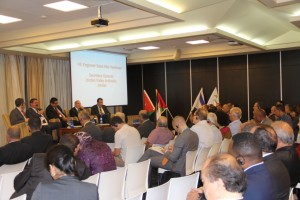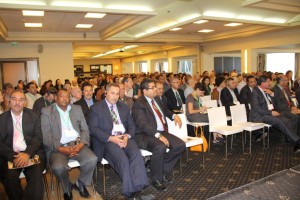 An exceptional regional conference was held last week on November 13-14 in Herzliya by EcoPeace / Friends of the Earth Middle East (FoEME). The event was held in the framework of FoEME’s renowned “Good Water Neighbors” (GWN) project, a grassroots environmental peace building project that, for over a decade, has been bringing together community members and local leadership from Israeli, Palestine and Jordanian communities.
An exceptional regional conference was held last week on November 13-14 in Herzliya by EcoPeace / Friends of the Earth Middle East (FoEME). The event was held in the framework of FoEME’s renowned “Good Water Neighbors” (GWN) project, a grassroots environmental peace building project that, for over a decade, has been bringing together community members and local leadership from Israeli, Palestine and Jordanian communities.
The project aims to raise awareness and advance cooperation between those communities who are bound together by the geo-hydrologic reality of cross border water resources. Yet, working as part of the GWN team for over seven years, it is still startling to be faced with the utterly different realities on the ground, just a mile or two away. In terms of water and environment, the abyss between neighboring communities manifests itself in remarkable inequalities with regards to available water resources and sanitation services. Being such a basic common good, the insecure and insufficient supply of water is an untenable burden on the everyday reality of millions of Palestinians. The events taking place in our region over the past two years should remind us that status quos are just an illusion, that the oppressed will demand their rights, and that the way forward to striking a new balance can be rocky and chaotic.
Hence, FoEME’s call for a new water agreement between Israel and PA today is so important. Such an agreement would finally replace the interim agreement set by Article 40 in the Oslo Accords – that was meant in any case, for only 5 years. The new proposed agreement would not only amend the inequalities in the current shared water division between Israel and Palestine, but will boost the much needed wastewater treatment sector in Palestine. It would end the ongoing pollution of our shared groundwater and potentially increase the availability of irrigation sources for the Palestinian agricultural sector.
A water agreement is essential because it has the capacity to lower tension and alleviate the socio-economic reality in Palestine; because water is a too basic a need to be held as a negotiation card; because the Israeli water economy can afford a new agreement; and because in its absence, we will continue to pollute our shared waters and literally ‘spit into the well from which we both drink’.
 The conference was attended by parliament members, high ranking officials and experts in the field of water, from Israel, Jordan and Palestine. The need for prioritizing a water agreement between Israel and Palestine today was a concept supported by not only the international development agencies working in our region, but by the official representative of the Palestinian Water Authority (PWA), Mr. Khalil Ghabiesh, Head of the West Bank Water Department as well as by Oded Eran, INSS member and Head of the Israeli negotiation team with the Palestinians (1999-2000). For many of the Israeli guests, it was startling to hear some of the facts presented by Mark Singelton, from the Quartet, on the suffocating Palestine economy (i.e. 50% unemployment among young Palestine). “Yes, we knew it was lagging behind, but didn’t know it has worsened so much” was one of the impressions shared with me by an Israeli guest, regarding the economic situation in Palestine.
The conference was attended by parliament members, high ranking officials and experts in the field of water, from Israel, Jordan and Palestine. The need for prioritizing a water agreement between Israel and Palestine today was a concept supported by not only the international development agencies working in our region, but by the official representative of the Palestinian Water Authority (PWA), Mr. Khalil Ghabiesh, Head of the West Bank Water Department as well as by Oded Eran, INSS member and Head of the Israeli negotiation team with the Palestinians (1999-2000). For many of the Israeli guests, it was startling to hear some of the facts presented by Mark Singelton, from the Quartet, on the suffocating Palestine economy (i.e. 50% unemployment among young Palestine). “Yes, we knew it was lagging behind, but didn’t know it has worsened so much” was one of the impressions shared with me by an Israeli guest, regarding the economic situation in Palestine.
Some of the panelists used the opportunity to articulate new commitments and endorse new approaches. Saad Abu Hammour, Secretary General of the Jordanian Jordan Valley Authority, publicly declared Jordan’s commitment to the rehabilitation of the Lower Jordan River and the leadership role his Authority would assume in the rehabilitation effort. On the issue of the demise of the Dead Sea, much due to the operations of the mineral extraction industries of Jordan and Israel, H.E. Abu Hammour called upon the Jordanian and Israeli Governments to charge the industries, on both sides, for the utilization of Dead Sea water, currently extracted without any fee being charged. “If industry were to pay their share of the demise of the Dead Sea, they would have an incentive to develop alternative technologies that would use far less water and therefore be less harmful to the Dead Sea”, he stated.
So with basic common sense, and a bit of luck, we may yet see a real change taking place and a drastically improved water reality for the inhabitants of our region.
This post is contributed by Michal Sagive Project Coordinator for the Good Water Neighbors project at the Israeli office.